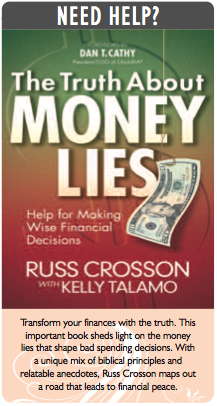BY RUSS CROSSON
WE ALL WANT A NICE HOME, but we should live somewhere that we can afford. If your dream pad is attached to a hefty mortgage, it can quickly turn into a nightmare. And when you allow your dreams to exceed your means, you can become “house poor.” Essentially, you are “house poor” when the cost of your home leaves little or no room for emergencies, savings, or other expenses. If that describes your financial situation, stop and think. When choosing to buy, rent, or sell, your decision should mirror your means.
Your kids don’t really care where they live. Many of us buy into the lie that we’re moving “for the kids.” But children care about how much time you spend with them. It doesn’t make sense to work longer hours to pay for a bigger house, and never be around for your family. Not convinced? Look back at your own childhood. Are you holding a grudge because your bedroom was small? Was your heart broken because your yard didn’t have sprinklers? Did you cry yourself to sleep because you didn’t live in a gated community? No way! Regretful adults commonly lament the relationships that they did (or didn’t) have with their parents. They tend not to bemoan the square footage of their childhood home.


Always put at least 20 percent down. This ensures that your mortgage principal is lower, reduces monthly payments, and enables you to avoid higher costs (such as the amount paid for mortgage insurance). If you’re unable to put down 20 percent of the cost, you should wait until you’ve saved more money, or shop for a less expensive home.
Strive to get a 15-year mortgage. A short term mortgage forces you to pay off your debt sooner. Of course, it might tighten your budget, but more of your money will go toward the principal (rather than interest payments). In addition, it’s best to avoid interest-only and adjustable mortgages.
If you can’t live in your home for at least three years, you’re better off renting. As a financial advisor, I’ve worked through the analysis and determined which is better – buying or renting. Factoring mortgage payments, utilities, taxes, insurance, repairs, maintenance, closing costs, real estate commissions, and various appreciation and tax rate assumptions – it’s always best to rent, if you won’t live in a place for at least three years. One of the greatest fallacies is that renting is throwing money away. That’s not the case. Until you’re settled, you shouldn’t rush to buy a home.
Live in your current house a little longer. For an extra year or two, withstand the temptation to upgrade to a bigger home. And during that time, put more into savings. Remember: The bigger the house, the greater the upkeep. A larger down payment will pay dividends with lower monthly payments for years to come. ![]()








